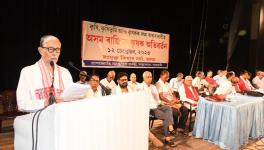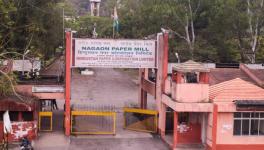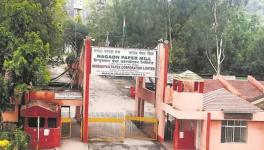Assam: United Struggle to ‘Save Industries and Save Workers’ Sweeps the State
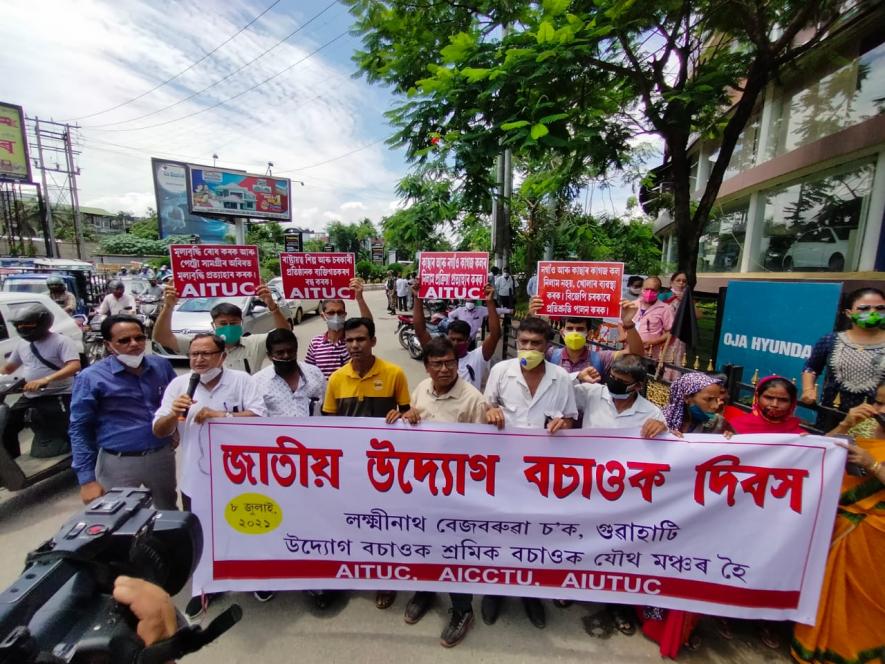
On Thursday, the Save Industries, Save Workers Joint Action Committee called for state-wide protests in Assam, reiterating their longstanding demands on a day they called 'State-Wide Save Industries Divas'. Workers, employees, students and activists gathered in several districts to observe the protest day.
For more than four years now, employees and workers of two paper mills in Assam have not been getting their salaries with 91 of them have died due to failure of availing the health requirements and 4 having committed suicides out of distress.
“In the 70s, there was a growing resentment among the youth in Assam due to widespread unemployment and the concomitant rise in anti-social activities. It was during Indira Gandhi’s regime when in 1970 two paper mills – one in Jagiroad in Nagaon (Now Morigaon) district and another in Panchgram, Hailakandi district – were established in Assam after laws were enacted in Parliament.. The construction work for the mills began in the latter part of the decade and they became operational from 1985 (the Jagiroad Mill) and 1988 (the Cachar Mill in Hailakandi) respectively,” Ananda Bordoloi told Newsclick.
Bordoloi is the general secretary of the Nagaon Paper Mill Employees Union. He and many of his comrades, who served in either of the two paper mills of Assam, are struggling to earn a livelihood.
“Production in the Jagiroad paper mill was suspended on March 13, 2017, and Cachar stopped work in October 2016. The moves were abrupt and took place without any discussion with us and without any prior notice. Our salaries have also been stopped since early 2017. In our meetings with the management we do not get any clarity on why this has happened, some even hint that it happened after government instructions,” said Bordoloi.
The two paper mills are central Public Sector Undertakings (PSUs) with the Jagiroad mill obtaining the status of a ‘Mini Ratna’ company in 2008-09. On an average, the mills had the capacity of producing 300 metric tons of paper daily. “Even on March 13, 2017, the day before production was stopped, the Jagiroad mill produced 276 metric tons of paper,” Bordoloi added.
The mills had been performing with promise in fulfilling the paper production requirement in the country. NCERT, state education boards, governments and commercial establishments used to procure the paper produced there. The paper requirement of Assam had been fulfilled by these two mills. The market price of paper per metric ton is now at one lakh rupees while it was between Rs 48,000 and Rs 52,000 earlier.
During the campaign for the recently-held state assembly election, ruling BJP leaders were quoted saying the mills would be reinvigorated, a demand being made for over four and a half years now. “Even Amit Shah said that the mills will be revived in a public gathering in Sorbhog of Barpeta district”—Bordoloi remembered.
Recently, the Himanta Biswa Sarma-led state Government paved the path of handing over the PSUs to private players when it announced their auctions.
Alongside workers and employees of the paper mills, bamboo cultivators in many districts of Assam will suffer a blow. Bamboo of varying varieties are in abundance in Assam; it is an essential raw material for paper production.
Not only paper mills, but other public sector industries in Assam are now expected to be handed over to private players. The privatisation of the state's oil fields is another contentious issue among industry stakeholders. Another important industry on the privatisation path is the Brahmaputra Valley Fertilizer Corporation Ltd. in the town of Namrup in Dibrugarh district.
The plant was the first natural gas-based fertilizer factory in India which would produce the cheapest product and was set up in the 1960s. “The raw material for the production of fertilizer in Namrup’s factory was provided by OIL (Oil India Limited),” said Bibek Das, convener of the Save Industry Save Workers Joint Action Committee.
Machinery in this industry needs a periodical upgrade. Since its inception in the 1960s, the machines have gone through at least three phases of upgrades. “The machines have a lifetime of around fifteen years and after that they need to be upgraded. Each of the fifteen years is called a unit. The Namrup fertilizer industry has seen its third unit till 2009. That was the time the industry needed to have started work on the fourth unit, which has not been done yet,” Das said.
“With the fourth unit not in place, production has gone down and workers have left too. The industry is now in a moribund state,” he added.
“Interestingly, ahead of the 2014 Lok Sabha elections, the BJP advocated for establishing the fourth unit. But it has been seven years of Narendra Modi as the PM and we have seen the BJP rule in Assam for over five years now. Nothing has been done to upgrade the Namrup fertilizer industry,” Das added.
The non-functioning of the Namrup fertilizer industry will also impact farmers in Assam, especially small-scale tea planters, who used to procure fertilizers at a very cheap rate from there. Das said that small tea planters used to get fertilizer at six rupees per kilogram, which was a boon for them.
Same is the case with Assam Co-operative Jute Mills Ltd, established in the 1970s in at Silghat in Nagaon district. Assam is the second largest jute producing state in India and produces 1.6 million bales of jute. Nagaon, Barpeta, Darrang and Goalpara are districts which primarily produce jute. The Silghat Jute mill is in a moribund state now.
That these well-established industries in Assam have been rendered useless is not only a threat to the livelihoods of a large population in the state, but also is a danger signal for the state’s economy.
Several organisations, including central trade unions, workers’ unions of several industries, students’ organisations and political parties have joined hands in an effort to revive the industries and to ensure the workers get their dues. In 2019, the Save Industries, Save Workers Joint Action Committee was formed. Since then, it has been fighting against government initiated privatisation efforts, demanding the revival of the industries and ensuring workers their dues.
On July 8, the joint committee called for state-wide protests, reiterating their longstanding demands on a day they called 'State-Wide Save Industries Divas'.
Workers, employees, students and activists gathered in several districts to observe the protest day. Talking to Newsclick, Pankaj Kumar Das, chief convener of the Committee, said: “Protests were held at Guwahati, Barpeta, Nalbari, Bangaigaon, Goalpara, Dhuburi, Kokrajhar, Sivasagar, Golaghat, Tinsukia, Dibrugarh and Karimganj districts. People from various backgrounds joined in the protests in large numbers. There was also a protest at the Guwahati Airport organised by the airport authority employees’ union,” he said.
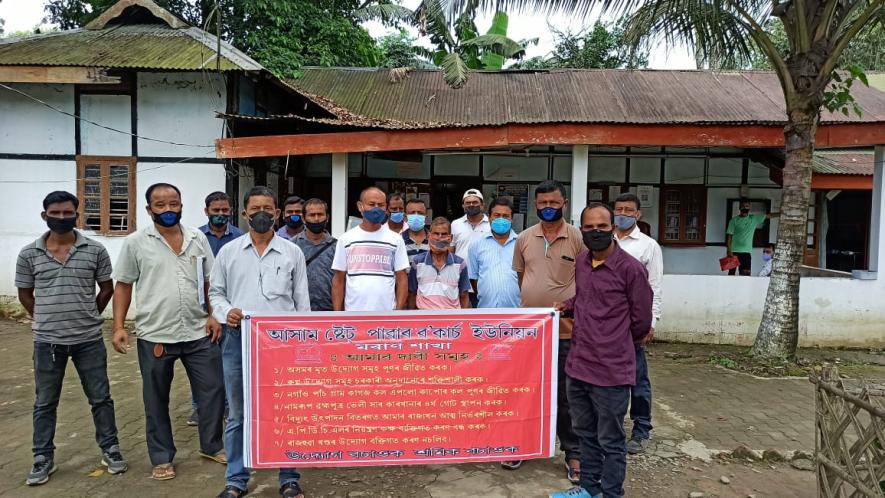
Protest at Dibrugarh, by Assam State Power Workers’ Union on the ‘Save Industry save workers day’
“We demand the immediate revocation of the proposed auctions of the paper mills and re-establishing them to their full capacity. Several workers have from distress and few have died by suicide as well. Himanta Biswa Sarma, the newly elected CM of Assam, declared that under his leadership Assam will be among the top five states in India. In reality we have witnessed an all round attack on the existing industries in Assam, which will result in a major blow to the economy of the state and further fuel the growing unemployment as well,” he added.
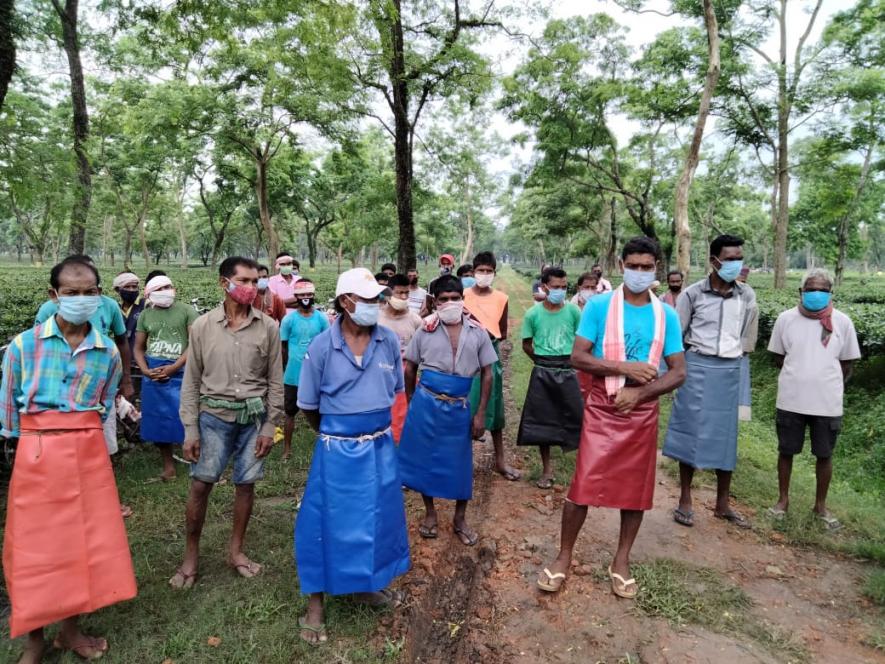
Protest at a Tea garden on the ‘Save Industry save workers day’
Dr. Hiren Gohain, a noted intellectual from Assam, supported the protest in a statement. “It is a proven fact that private capital’s only desire is to acquire more and more profit for itself and it is de-linked from employment generation. It is a baseless claim that public sector enterprises only result in corruption and losses. Plenty of examples exist in Assam and outside where public sector enterprises run successfully and make a profit,” he said.
“In fact, political interference and corrupt bureaucratic functioning are mainly responsible for destruction of the public sector industries. Rejuvenating the public sector industries of Assam will not only address the growing unemployment, but also contribute to revenue generation,” he further noted.
Get the latest reports & analysis with people's perspective on Protests, movements & deep analytical videos, discussions of the current affairs in your Telegram app. Subscribe to NewsClick's Telegram channel & get Real-Time updates on stories, as they get published on our website.









